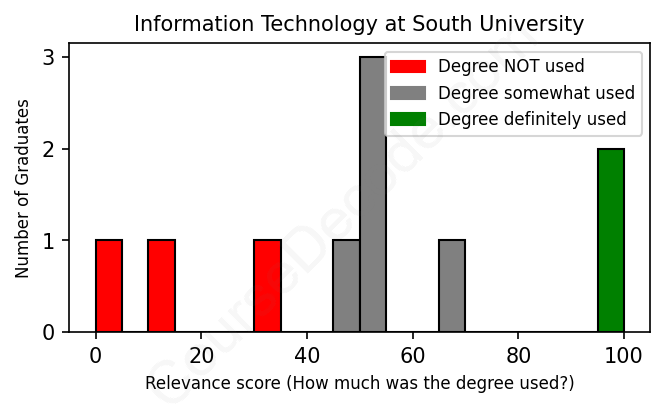
First, some facts. Of the Information Technology graduates from South University we've analyzed , here's how many have used (or NOT used) their degree in their career:

These are estimates based on AI analysis of 10 LinkedIn profiles (see below).
The verdict? Significantly below average. Overall, with an average relevance score of 51%, Information Technology graduates from South University have a much lower likelihood (-16%) of finding work in this field compared to the average graduate across all fields:
And for comparison, here's the chart for all profiles we've looked at across all degrees.
Also, after graduating, 40% of these graduates have pursued further education other than another Bachelor's degree (such as a Masters degree or other), compared to the average across all profiles of 35%. This suggests you may need more than just a Bachelors degree to be competitive as a Information Technology graduate.
See the details:
|
Relevance score: 14% We think this person has NOT gone into a career related to their degree. We think this person has NOT gone into a career related to their degree.
DEGREE INFOGraduated in 2012 from South University with a Bachelors in Information Technology. Also pursued further education since (see below). JOB HISTORY SINCE GRADUATIONAssistant Carson & Associates Realtors 2013 - 2013 Referral Specialist  Prisma Health Aug 2018 - Jun 2020 Site Administrator  South Carolina Department of Corrections Mar 2021 - Dec 2023 Site Administrator  Contractor for SCDC Mar 2021 - Mar 2024 Benefit Files Analyst 1  BlueCross BlueShield of South Carolina Mar 2024 - Present FURTHER DEGREES DONE SINCE GRADUATINGInformation Support Specialist, COMPTIA A+Training Concepts 2014 - 2014 ABOUTA challenging career at a growth-oriented company, with the opportunity for professional growth based on performance, that will allow me to further utilize my skills and acquire new abilities. |
The top 10 most common jobs done by the graduates we've analyzed (ranked most common to least) are:
When looking at job placements for graduates from South University with a degree in Information Technology, it seems there are a mix of roles that range from highly relevant to those that don’t really tap into their IT education. Many graduates have landed jobs like Web Developer and Technical Specialist positions where they get to use the skills they learned in their degree directly. These roles typically involve coding, web design, and problem-solving—exactly what you’d expect from someone who studied IT. Other similar roles, like Full-stack Developer and Director of Development, also show that some graduates have gone on to have significant responsibilities in tech-focused environments.
On the flip side, there’s quite a few graduates who have ended up in jobs that seem more related to customer service or completely unrelated fields, like driving for rideshare companies or working as assistants. These roles often don’t utilize their IT background at all, which kind of raises the question of whether they found their degrees helpful in landing those jobs. While it’s great to see that some alumni are thriving in tech-related positions, it’s definitely a mixed bag overall, with plenty of graduates not applying the relevant skills from their Information Technology degree in their current jobs.
Here is a visual representation of the most common words in job titles for Information Technology graduates (this is across all Information Technology graduates we've analyzed, not just those who went to South University):

Looking at the career trajectories of graduates from South University with a degree in Information Technology, there’s a bit of a mixed bag. For many of these individuals, their first jobs after graduation don’t necessarily align directly with IT. You see some folks starting off in customer service roles, freelance gigs, or even in positions like site administrators or support representatives. This suggests that while they may have the technical skills from their education, it might take some time for them to find roles that fully utilize their IT expertise. Over the first couple of years post-graduation, it seems some have transitioned into more relevant IT positions, particularly in web development or technical support, but others remain in somewhat unrelated fields.
Fast forward five to ten years, and the picture varies quite a bit. Some graduates have carved out solid careers in IT, like the Lead Developer who eventually became the Director of Development or the Data Analyst who progressed to a more senior technical role. However, others have ventured into jobs that stray further from the core of information technology. You have a mix of success stories, especially for those who stuck with the field—they've moved into substantial roles within tech companies or continue to develop their skills as freelancers. But it’s fair to say that not every graduate has landed in ideal tech roles. So, it seems that while many find their way into IT, others might be navigating around it or taking a little longer to get there. Overall, it’s a journey of ups and downs rather than a straight path to a tech dream job.
Honestly, a Bachelor’s degree in Information Technology can vary in difficulty depending on your interests and strengths, but it’s generally considered to be manageable for most students. At South University, like at many schools, you'll tackle topics like programming, networking, and databases, which might seem daunting if you're not super tech-savvy. However, if you're curious about technology and ready to put in the effort, you’ll likely find it to be an engaging challenge rather than an overwhelming one. The coursework is designed to build your skills over time, so while it might take some diligence to stay on top of assignments and projects, it’s definitely doable, especially if you reach out for help when you need it. Overall, it's about what you put in; if you’re passionate about IT, you'll probably find it more fun than hard!
Most commonly, in the LinkedIn profiles we've looked at, it takes people 4 years to finish a Bachelor degree in Information Technology.
Looking at the job histories of these South University IT grads, it’s a mixed bag when it comes to making decent money. The 2011 graduate seems to be stuck in a gig economy, driving for Uber and Lyft, which might not provide a stable income—especially since they took a detour from healthcare to those jobs. The 2012 grads show some promise: one has a solid position as a Product Engineer, which usually pays well, while another climbed the ranks to Director of Development, indicating a decent paycheck. The 2015 grad at Apple likely makes good money given the company's reputation and their senior roles. However, the newer grads from 2018 and 2019 have more entry-level jobs that aren't as lucrative, and while they could earn more with experience, they’re not exactly rolling in it right now. Overall, it looks like some are doing quite alright, especially those who have held positions for longer, but many are still finding their way in the job market.
Here is a visual representation of the most common words seen in the "about" section of LinkedIn profiles who have a Bachelor degree in Information Technology (this is across all Information Technology graduates we've analyzed, not just those who went to South University). This may or may not be useful:

Here are all colleges offering a Bachelor degree in Information Technology (ordered by the average relevance score of their Information Technology graduates, best to worst) where we have analyzed at least 10 of their graduates: